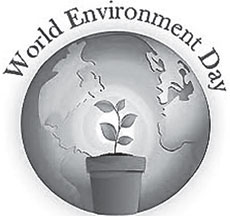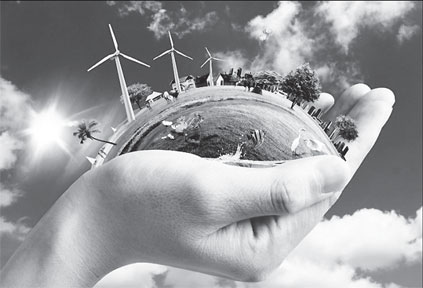|
June 5 -World Environment Day :
A wake-up call to care for our environment
by S. Weragoda
 The environment is something we are very familiar with. When we step
outside our house what we are faced with is the environment. It's
everything that makes up our surroundings and affects our ability to
live on the earth - the air we breathe, the water that covers most of
the earth's surface, the plants and animals around us, and much more. The environment is something we are very familiar with. When we step
outside our house what we are faced with is the environment. It's
everything that makes up our surroundings and affects our ability to
live on the earth - the air we breathe, the water that covers most of
the earth's surface, the plants and animals around us, and much more.
In recent years, scientists have been carefully examining the ways
that people affect the environment. They have found that we are causing
air pollution, deforestation, acid rain, and other problems that are
dangerous both to the earth and to ourselves. These days, when you hear
people talk about “the environment”, they are often referring to the
overall condition of our planet, or how healthy (or unhealthy) it is.
World Environment Day (WED), commemorated each year on June 5, is one
of the principal vehicles through which the United Nations stimulates
worldwide awareness of the environment and enhances political attention
and action.
This year’s celebration on June 5 will be hosted by Mongolia and will
focus on reducing food waste and loss. It is aimed at being the biggest
and most widely celebrated global day for positive environmental action.
WED activities take place all year round and climax on June 5 every
year, involving everyone from everywhere.
 Observance of WED began in 1972 as a way to raise awareness of the
environment and encourage political attention and action. This year’s
theme for the Day is “Think. Eat. Save. Reduce Your Foodprint,” which
builds on a global campaign of the same name launched earlier this year
by UNEP, the Food and Agriculture Organisation (FAO) and other partners
to reduce food and waste loss. The theme for this year’s WED
celebrations is an anti-food waste and food loss campaign that
encourages us to reduce foodprint. According to the UN Food and
Agriculture Organisation (FAO), every year 1.3 billion tonnes of food is
wasted. This is equivalent to the same amount produced in the whole of
sub-Saharan Africa. At the same time, one in every seven people in the
world go to bed hungry and more than 20,000 children under the age of
five die daily from hunger. Observance of WED began in 1972 as a way to raise awareness of the
environment and encourage political attention and action. This year’s
theme for the Day is “Think. Eat. Save. Reduce Your Foodprint,” which
builds on a global campaign of the same name launched earlier this year
by UNEP, the Food and Agriculture Organisation (FAO) and other partners
to reduce food and waste loss. The theme for this year’s WED
celebrations is an anti-food waste and food loss campaign that
encourages us to reduce foodprint. According to the UN Food and
Agriculture Organisation (FAO), every year 1.3 billion tonnes of food is
wasted. This is equivalent to the same amount produced in the whole of
sub-Saharan Africa. At the same time, one in every seven people in the
world go to bed hungry and more than 20,000 children under the age of
five die daily from hunger.
Given this enormous imbalance in lifestyles and the resultant
devastating effects on the environment, this year’s theme -
Think.Eat.Save - encourages us to become more aware of the environmental
impact of the food choices you make and empowers you to make informed
decisions.
Implication
The first part of this year’s theme (Think) encourages people to
become aware of the environmental implication of food production and
wasted food and therefore help save our environment. On many occasions
more food than needed is prepared in our homes, hotels or restaurants.
Food waste contributes to negative environmental impacts like increase
of greenhouse gas emissions and biodiversity loss. Waste of food means
also waste of all the resources and inputs (such as water, energy) used
in the production of all the food and more use of energy in food
processing and final disposal generates greenhouse gases in the process
of degradation in the landfill.
The theme’s second part (Eat) encourages people to make informed
decisions of the food choices while also improving the quality of their
life.
The third part (Save) calls upon people for sustainable consumption,
doing more and better with less, reduce their foodprint and adopt a more
sustainable lifestyle, through Reduce, Reuse and Recycle.
Shift
Mongolia has been chosen for its efforts to shift towards a green
economy in its major economic sectors such as mining and for promoting
environmental awareness among youth, the UN Environment Program (UNEP)
said in a statement. The Asian nation is facing enormous challenges,
including growing pressure on food security, traditional nomadic herding
and water supplies as a result of the impacts of climate change, UNEP’s
Executive Director Achim Steiner said.
“Indeed it is estimated that annual mean temperature has increased by
over 2°C during the past 70 years and precipitation has decreased in
most regions, except the western part of the country, indicating that
Mongolia is among the most vulnerable nations in the world to global
warming.
Challenges
“Yet its Government is also determined to meet these challenges and
seize the opportunities of a less-polluting and more sustainable future
– from a moratorium on new mining pending improved environmental
regulations to plans to become a renewable energy power-house and
exporter of clean energy regionally,” he said.
He made this known during UNEP’s Governing Council session in
Nairobi, Kenya, where hundreds of environment ministers and civil
society representatives met to discuss some of the most pressing
environmental issues.
“I am sure that as the global host of WED, Mongolia will demonstrate
to the world that a transition to a green economy is possible, even
within some of the most traditionally challenging industrial sectors,
when leadership, vision, smart policies and political will are
translated into action on the ground,” Steiner said.
Are we too responsible for the safety and maintenance of a healthy
environment? Our role in the felling of trees due to our ever growing
needs has been on an unprecedented scale and has caused an alarming
depletion in green cover. The overall rainfall has been decreasing over
the years due to the greenhouse effect, leading to disastrous climate
change.
It is found out that many important glaciers have significantly
shrunk in size. Polar ice is also melting fast. Large icebergs have been
seen floating near Antarctica.
If this trend continues, sea levels will rise and entire islands
could be submerged. In order to avoid ending up in a watery grave,
millions living on the coast or near the sea would be forced to
relocate.
Further increase in global temperature will also lead to loss of
vital flora and fauna. As each species has a vital role to play in the
food chain, any imbalance means destruction of the ecosystem itself. It
is incumbent on everyone concerned to avoid this possibility. Time is
running out! |


